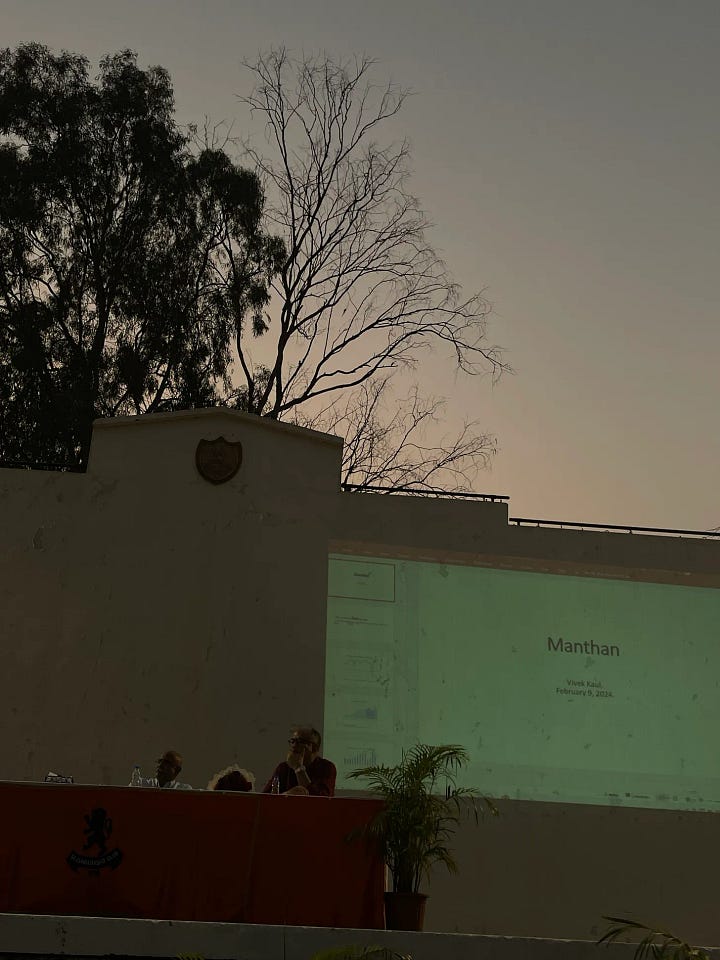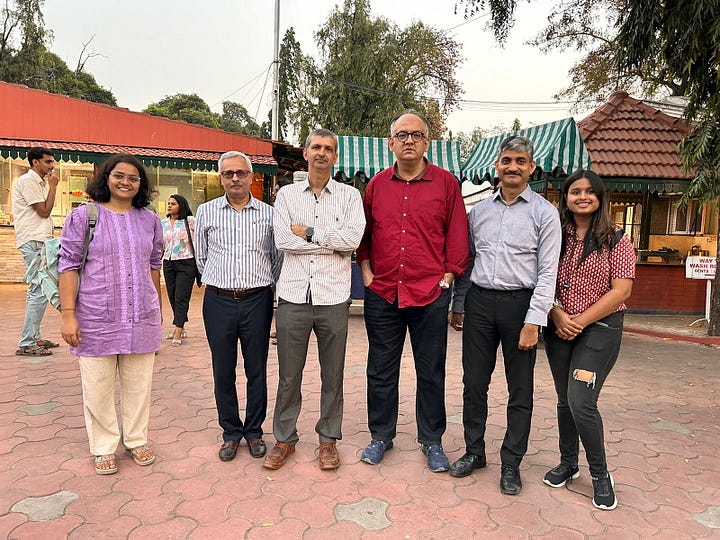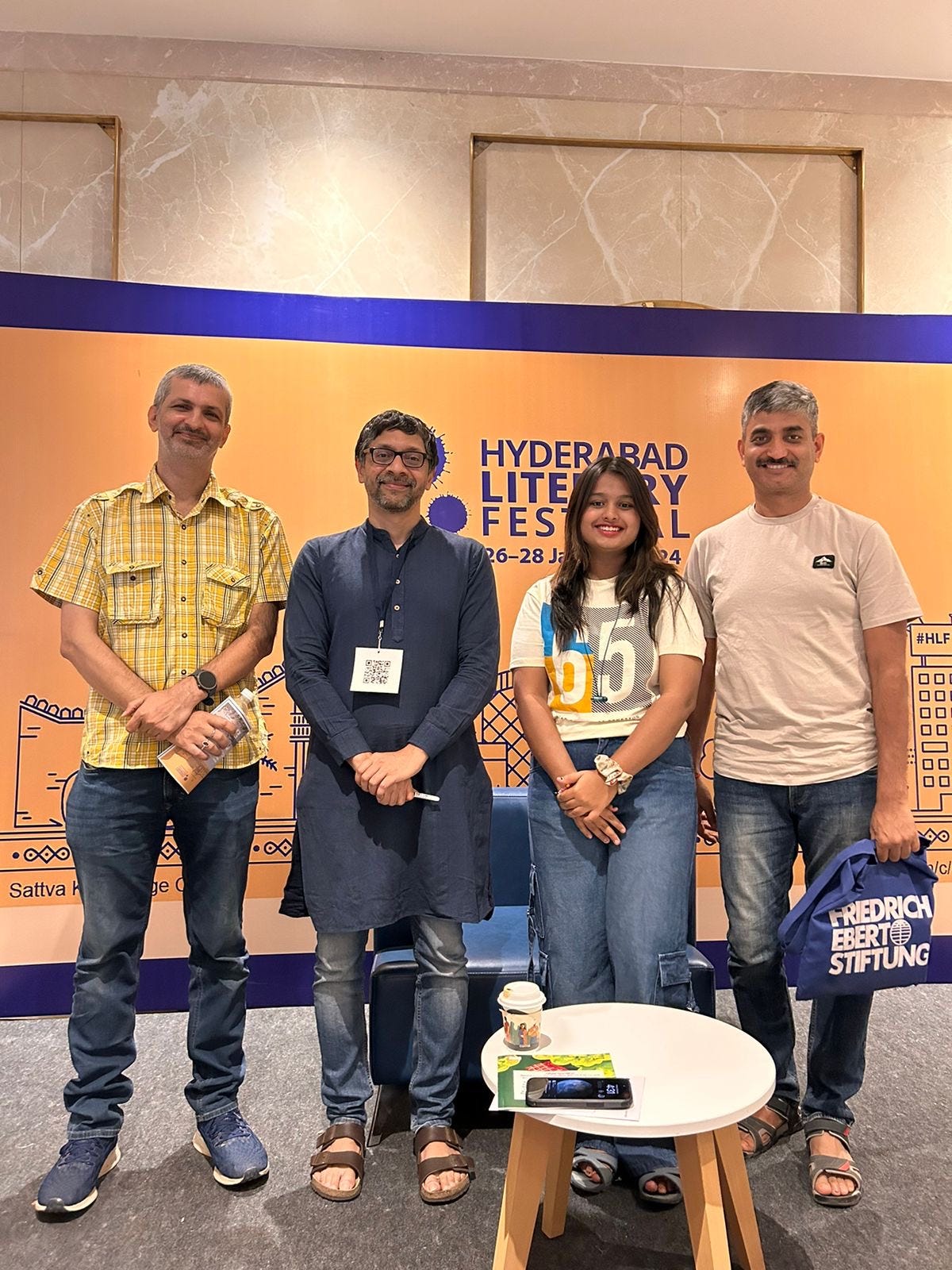Hey everyone!
Long time no see! Happy New Year!
I apologise for my absence lately; the start of this new year has been quite overwhelming for me. I've been grappling with a severe case of writer's block, leaving many of my write-ups languishing as drafts while college demands have hit me like a train. Nevertheless, my absence here doesn't reflect a lack of experience or activity on my part. Quite the opposite! I have been lucky enough to attend some insightful sessions.


One such was attending Vivek Kaul's Manthan session at the Secunderabad Club on the Indian economy today. He provided a refreshing perspective on how we should view our economy and also on how we should be consuming information. evoking the psychologist Daniel Kahneman in his book Thinking, Fast and Slow which struck me deeply,
"An essential design feature of the associative machine is that it represents only activated ideas. Information that is not retrieved (even unconsciously) from memory might as well not exist."
This concept essentially describes how our minds work when processing information and how it affects our understanding and communication. The idea he's presenting is that our brains only retain and work with information that is actively retrieved from memory, either consciously or unconsciously. Information that we don't recall might as well not exist because it doesn't influence our thoughts, decisions, or behaviour. This can lead to biases and inaccuracies in our thinking, as we may overlook or forget important information that could influence our understanding.
In today's discourse, where absolutism often prevails, this notion resonates deeply. Each harbours their version of the truth, yet we're often reluctant to consider opposing viewpoints, clinging to our own experiences as definitive.
A couple of months ago, I completed the "Learn to Discern" course in collaboration with the American Embassy and IREX on Media Literacy where I grappled with the nuanced disparities between fact and opinion in digital media. The increasingly blurred lines between unbiased reporting and personal bias pose challenges for journalists and consumers alike. Echo chambers and filter bubbles exacerbate this issue, reinforcing existing beliefs without offering comprehensive insights. Our news consumption has been reduced to scrolling through catchy headlines, often devoid of the full story. Our eagerness for quick news has restricted our information as there is no further introspection. As I wrote in one of my previous newsletters, in today's digital age, where AI and editing tools can manipulate reality, the art of fact-checking is more crucial than ever, especially during elections. With individuals assuming the roles of journalists on platforms like Twitter, the phrase "don't believe everything you see" rings truer than ever.
Engaging with individuals holding diverse viewpoints has led me to reflect on the concepts of objectivity and bias in our conversations. As a journalism student, I understand the pivotal role of objectivity in shaping global discourse. Despite striving to consider multiple perspectives, my biases inevitably influence my work. Navigating the information landscape requires constant vigilance regarding information delivery, source credibility, and combating misinformation and disinformation.
In my interactions with online creators, I actively seek out those who acknowledge their biases and present information transparently. As a media student, I understand the growing responsibility of meticulously distinguishing between truth and objectivity. However, the scope of our discourse extends beyond mere objectivity. It's disheartening to observe a decline in tolerance towards others as the world becomes more diversified and accessible. It's imperative to move beyond mere tolerance; acceptance should be the norm.
Recently, I attended a captivating talk by MasalaLabs Author Krish Ashok at the Hyderabad Literary Festival (HLF) on food and the misinformation surrounding it. One particular interaction during the Q&A session left a lasting impression on me.
Krish spoke about the intertwining of food and culture, highlighting how some traditions and superstitions, even without scientific backing, provide comfort and belonging to people. I resonate deeply with this notion. Just because one doesn't believe in an idea doesn't make it inherently bad or wrong. Unless it directly causes harm, humans should embrace diversity and live and let live. Our uniqueness lies in our diversity, and it's essential to celebrate and respect our differences.
In the age of omnipresent discussion platforms, the challenge of forming opinions is compounded by the prevailing "us vs. them" dichotomy. The truth seldom resides in absolutes; it exists somewhere in the nuanced shades of grey between conflicting viewpoints. The perpetual dilemma of being on the right side of history underscores the need for continuous introspection and improvement.
In conclusion, Richard Streckfuss's quote -
“Objectivity was founded not on a naive idea that humans could be objective, but on a realisation that they could NOT.” - Richard Streckfuss
reminds us that objectivity is not about humans being entirely objective, but rather about realizing and mitigating our inherent biases. It's a journey of self-awareness and constant vigilance.
Thanks for listening, and here's to a year of growth, learning, and embracing diversity!





Honestly, this realisation has no place in the media until the media stop itself from being opaque to the audience. It's still an imperative to the Indian media to make viewers choose and to be unbaised